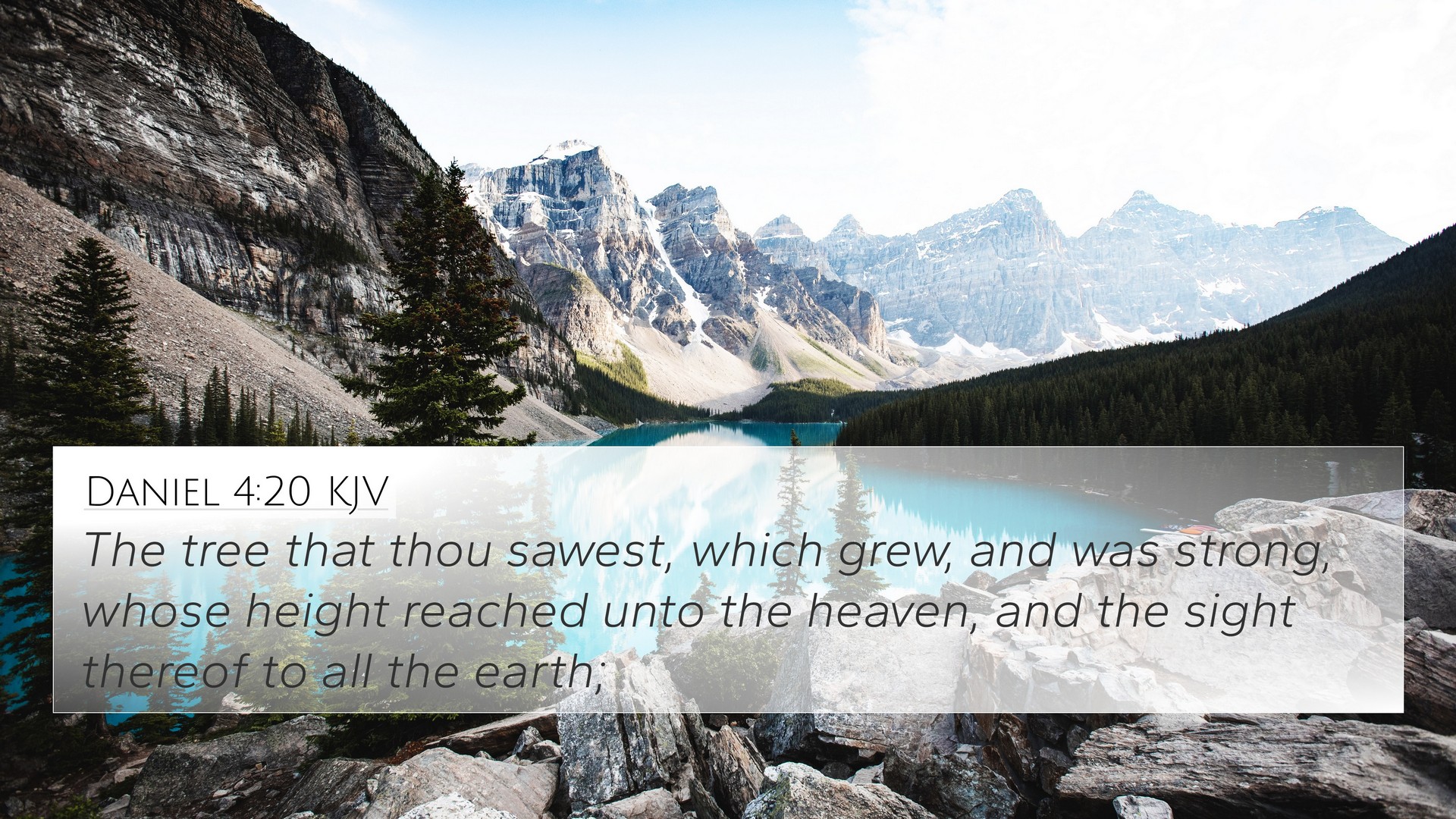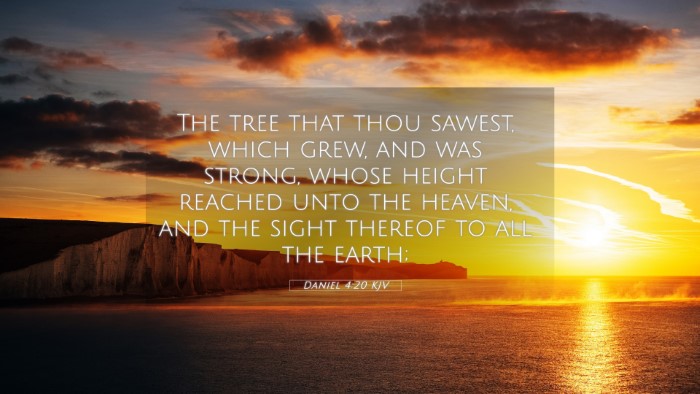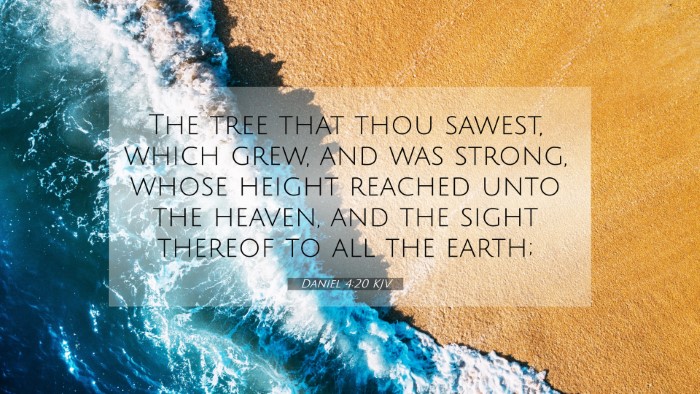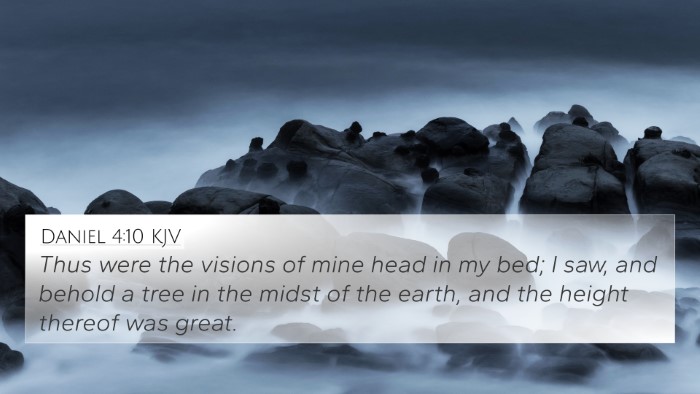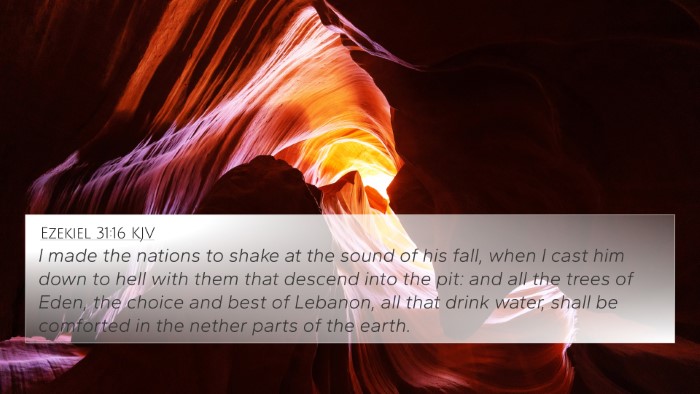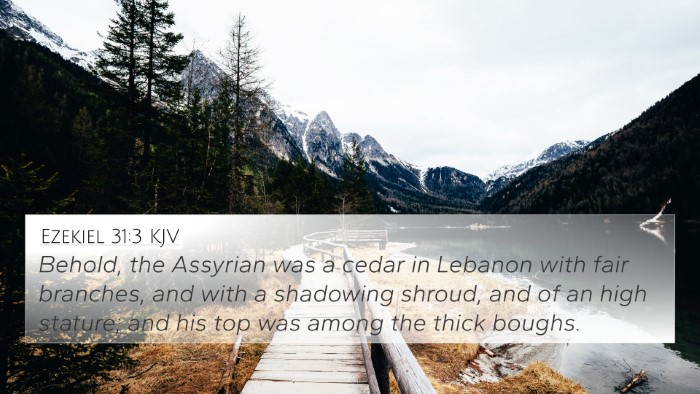Understanding Daniel 4:20
Daniel 4:20 states:
"The tree that you saw, which grew, and was strong, whose height reached unto the heaven and the sight thereof to all the earth."
Summary and Interpretation
This passage describes a vision given to King Nebuchadnezzar, a significant moment in the Book of Daniel. The tree symbolizes strength, grandeur, and stability but also serves as a precursor to the ominous fate that will befall the king.
Commentary Insights
-
Matthew Henry:
Henry emphasizes the enormity of the tree, representing Nebuchadnezzar's kingdom. It is a poetic portrayal of his power and the admiration it evokes among nations. However, Henry warns that this greatness is temporary and subject to divine judgment.
-
Albert Barnes:
Barnes elaborates on the significance of the tree reaching heavens, symbolizing an empire that aspires to divine status yet demonstrates pride that leads to its impending downfall. This reflection serves as a cautionary note on the nature of human arrogance in the face of God's sovereignty.
-
Adam Clarke:
Clarke points out that the visibility of the tree to all the earth suggests that Nebuchadnezzar's influence was far-reaching. However, he stresses that the vision illustrates the transience of earthly power and that ultimate authority lies with God.
Cross-References
Understanding Daniel 4:20 becomes richer when placed alongside other biblical texts. Here are some relevant cross-references:
- Ezekiel 31:3-7: This passage discusses the grandeur of trees and their symbolism in relation to powerful nations.
- Isaiah 14:13-15: A pronouncement relating to the fall of the prideful, paralleling Nebuchadnezzar's eventual humbling.
- Proverbs 16:18: "Pride goes before destruction," echoing the theme of pride preceding the fall seen in Nebuchadnezzar's story.
- Revelation 18:7: Reflects the concept of pride in great Babylon, which parallels Nebuchadnezzar's kingdom as it ultimately faces judgment.
- Matthew 23:12: "Whoever exalts himself will be humbled" related to the fate of prideful leaders.
- Jeremiah 27:6: God's sovereignty over nations as He gives power to whom He wills, linking to the theme of divine authority in Daniel.
- Daniel 5:20: The direct consequence of pride linking to Nebuchadnezzar's fate, giving a complete picture of consequences.
- James 4:6: "God opposes the proud but gives grace to the humble," reinforcing God's stance towards pride and humility.
- Psalms 37:35: Comparison of the wicked prospering likened to a green tree, showing the fate of the proud in contrast to the righteous.
- Job 20:5: The ephemeral nature of the joy of the wicked, further explaining the short-lived nature of prideful prosperity.
Thematic Connections
The themes present in Daniel 4:20 resonate throughout Scripture, establishing a framework for understanding pride, divine sovereignty, and the eventual humility that follows.
Inter-Biblical Dialogue
The connections between this verse and others create an essential dialogue regarding God's control over earthly kingdoms and the fate that pride leads to. Such themes resonate through both Old and New Testaments, emphasizing the timeless nature of these messages.
Research Tools for Bible Cross-Referencing
To further explore the connections between Bible verses, consider utilizing:
- Thematic Bible Concordances
- Cross-Reference Study Bibles
- Bible Cross-Reference Guides
- Online Bible Study Tools for Cross-referencing
Practical Application
For those studying Daniel 4:20, think about how the concept of pride leads to downfall remains relevant today. This verse serves as a reminder for humility in our lives and the acknowledgment of God's overarching authority.
Conclusion
As we study Daniel 4:20, we uncover profound lessons on pride, the nature of kingdoms, and divine sovereignty. By cross-referencing this verse with others, we gain a holistic understanding of its message and its implications for believers today.
